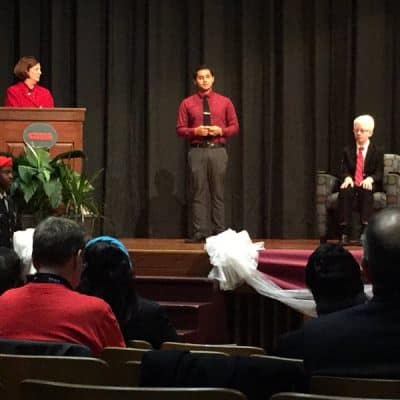
The Charlotte-Mecklenburg school board is split along racial lines about whether to extend Superintendent Ann Clark’s contract by another year or immediately begin a fast-paced national search to hire a replacement before the end of July.
In a seven-hour retreat on Saturday, the board split 5-4 in favor of keeping Clark another year so the district can focus on its student assignment review. The vote isn’t binding, and members will make a final decision on Feb. 9.
Members Paul Bailey, Eric Davis, Elyse Dashew, Rhonda Lennon and Tom Tate—who are white—supported extending Clark’s contract. Thelma Byers-Bailey, Ericka Ellis-Stewart, Ruby Jones, and board chair Mary McCray—who are black—support starting a national search.
Clark took over the top educator job after the abrupt resignation of Heath Morrison in November of 2014. She agreed to stay on through July 31 of this year, but was planning to retire after that. Clark has told the board she would be willing to stay on another year if they choose to keep her.
The board’s split reflects previous racial overtones in the long-stalled superintendent search. At community meetings and school board hearings, some members of Charlotte’s African-American community said they’ve been shut out of the discussions about Clark’s future.
McCray said Saturday it is possible to complete a search and bring a new superintendent on board before Clark’s contract expires. She said any notion to the contrary is “hogwash.”
According to The Charlotte Observer, Davis said the district would be at risk if the school board tried to switch superintendents while crafting a student assignment plan, saying it would be akin to “changing quarterbacks the week before the Super Bowl.”
But McCray disagreed.
“If we can’t do more than one thing at a time, not only should we be ashamed but the community should demand new representation,” she said.
A chief concern among public education advocates and those who keep a close eye on the school board is the potential for friction about the superintendent search to spill over to other topics.
More than a decade ago, animosity among members of the school board led to bitter, dysfunctional meetings. At one point, a member asked for Charlotte-Mecklenburg police to escort her to and from the meetings because she said she felt threatened by her colleagues.
The media quickly latched onto the drama, and board business came to a screeching halt. Voters had no appetite for the nonsense, either, and promptly rejected a nearly $500 million bond package in 2005, citing a lack of confidence in the school board as their chief reason.
The fallout damaged the district’s reputation and, significantly, put a squeeze on capital projects that is still felt today. Observers say this board could easily slip into a similar rut, fighting over process and personalities rather than meaningful issues.
McCray herself hinted at that possibility during the retreat.
“You cannot operate with a divided board,” she said, “because it’s going to throw a monkey wrench into everything you do.”


